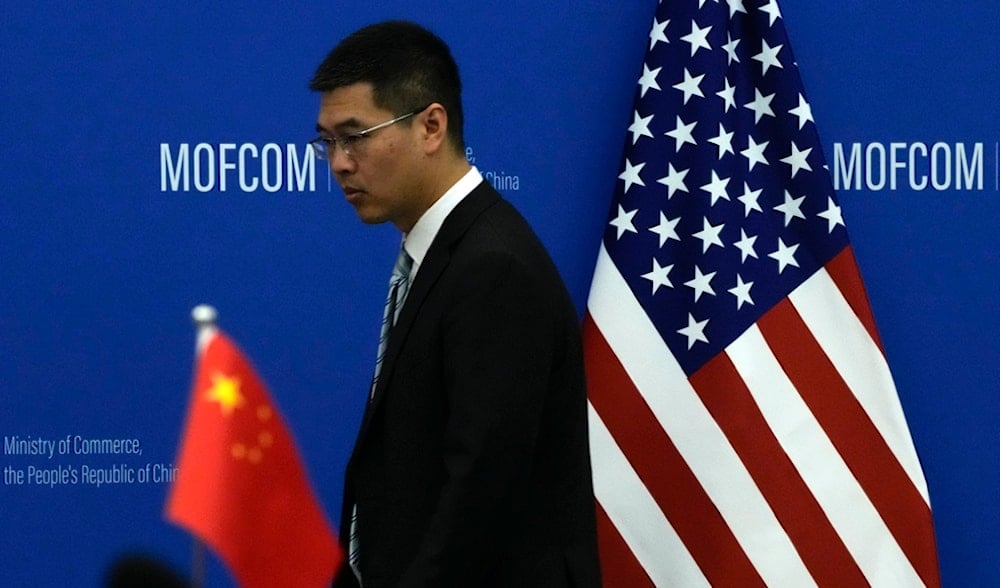China retaliates, bans export of critical microchip elements to US
China announces bans on essential metals for semiconductors, solar cells, radars, and more, in retaliation to the US' restrictions on Chinese microchip production.
-

A Chinese official walks by the China and U.S. national flags before a meeting between Commerce Secretary Gina Raimondo and Chinese Minister of Commerce Wang Wentao at the Ministry of Commerce in Beijing on Aug. 28, 2023. (AP)
China announced a ban on exports of certain key materials used in semiconductor production to the United States, escalating trade tensions a day after the US imposed restrictions targeting China's ability to produce advanced chips.
The banned materials include gallium, antimony, and germanium metals, according to a statement issued by China's Ministry of Commerce, citing "national security" concerns.
Exports of graphite, another semiconductor component, would face "stricter reviews of end-users and end-uses," the ministry added. These measures reinforce existing restrictions on critical mineral exports that China began implementing last year, but are limited to the US market.
"To safeguard national security interests and fulfill international obligations such as non-proliferation, China has decided to strengthen export controls on relevant dual-use items to the United States," the ministry further stated.
Gallium and germanium are essential for semiconductors, with germanium also used in infrared technology, fiber optic cables, and solar cells. Meanwhile, antimony is utilized in ammunition and other military equipment, while graphite is a major component in electric vehicle (EV) batteries.
According to the Chinese Commerce Ministry, these materials are restricted due to their potential military applications. Previously, companies could apply for special permits to export these materials, but this exception has been removed.
It is worth noting that China produces 94% of the world’s gallium and 83% of its germanium. There are concerns that China might also target additional critical minerals, such as nickel and cobalt, which have even broader applications.
According to Chinese customs data, there were no shipments of wrought or unwrought gallium or germanium to the US through October this year, whereas a year earlier, the US was the fourth and fifth-largest market for these minerals. Similarly, China’s shipments of antimony products in October dropped by 97% from September following Beijing’s export restrictions.
This comes after the Biden administration announced new restrictions, including limits on the sale of 24 types of semiconductor-manufacturing equipment and access to American technology for 140 Chinese firms, including chip leaders Piotech and SiCarrier.
US officials said the measures aim to curb China’s progress in developing AI capabilities for military use and to weaken its domestic semiconductor sector, which poses a national security risk to the US and its allies.
Reactions and consequences
China's countermeasures came as a result of what it coined a US attempt to politicize and weaponize the industry, prompting field experts, such as Dylan Loh, an assistant professor at Singapore’s Nanyang Technological University, to allocate the move as a clear "retaliatory strike at the US."
"It drives home an important point which is that China is not completely passive [and] there are some cards it can play and hit the US with as well with regards to chips," he added.
Moreover, Chong Ja Ian, an associate professor of political science at the National University of Singapore, said these "back-and-forth curbs" could disrupt global supply chains and lead to inflationary pressures if they affect trade with third-party countries.
Similarly, Brady Wang, an associate director at technology market research firm Counterpoint, told AFP that while the metals are crucial for high-tech industries, they are positioned upstream in the supply chain, so the immediate impact on production is limited. "Given the ongoing US-China trade tensions, many intermediate manufacturers have been stockpiling these materials," he added.
On Tuesday, Chinese trade associations issued similar statements urging their members to explore local alternatives to US-made chips.
The Internet Society of China advised companies to "exercise caution when procuring US chips, seek to expand partnerships with chip manufacturers in other countries and regions, and actively use chips produced in China by both domestic and foreign companies."
The China Association of Automobile Manufacturers criticized the US for arbitrarily altering control rules, severely affecting the stable supply of US chip products.
The association stated, "The Chinese auto industry’s trust in US chip products is being undermined, and US-made auto chips are no longer seen as reliable and safe."

 4 Min Read
4 Min Read








